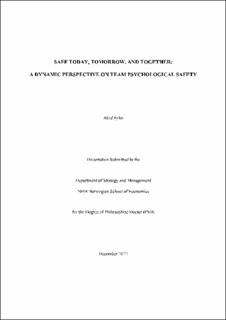| dc.description.abstract | There is an increasing focus in organizations on building psychologically safe teams.
This follows a large—and rapidly growing—body of research supporting the importance of
team psychological safety for effective teamwork. Still, there is a lack of research on the
dynamics of team psychological safety. This is somewhat surprising given the ever-changing
nature of teams and leaves us with an incomplete understanding of team psychological safety.
This dissertation makes several important contributions to the research field.
Paper 1 provides a comprehensive overview of the temporal dynamics of team
emergent states, of which team psychological safety is one. This literature review shows that
team emergent states have no universal pattern, why team emergent states should be measured
as emergent, why team emergent states arise, the consequences of temporal dynamics, and
why studying the emergent element of these states matters. Overall, the paper raises
awareness of the importance of taking the “emergent” in team emergent states seriously.
In Paper 2, I explore the dynamic nature of team psychological safety. By studying
teams from when they are established and over different time horizons, this paper reveals how
temporally dynamic team psychological safety may indeed be and how its emergence and
development relate to the practices of the team. Since team psychological safety may both
wax and wane, time itself is neither sufficient nor necessarily positive. Instead, team
psychological safety reveals itself as a perishable good.
Where Papers 1 and 2 emphasize the temporal dynamics of team psychological safety,
Paper 3 addresses the within-team dynamics—more specifically, how sharedness among team
members (that is, team psychological safety climate strength) moderates the relationship
between team psychological safety and team performance. Moreover, explorative analyses
reveal how sharedness is not necessarily beneficial. In particular, when psychological safety is
low, a safe team member among the unsafe may positively impact team performance.
In sum, this thesis contributes to the research field by identifying the emergent nature
of team emergent states in general and team psychological safety in particular and by revising
the view of team psychological safety as necessarily being perceived similarly among team
members. I discuss the theoretical contributions and practical implications of these findings.
Keywords: team emergent states, team psychological safety, temporal dynamics, team
psychological safety climate strength, team performance | en_US |
